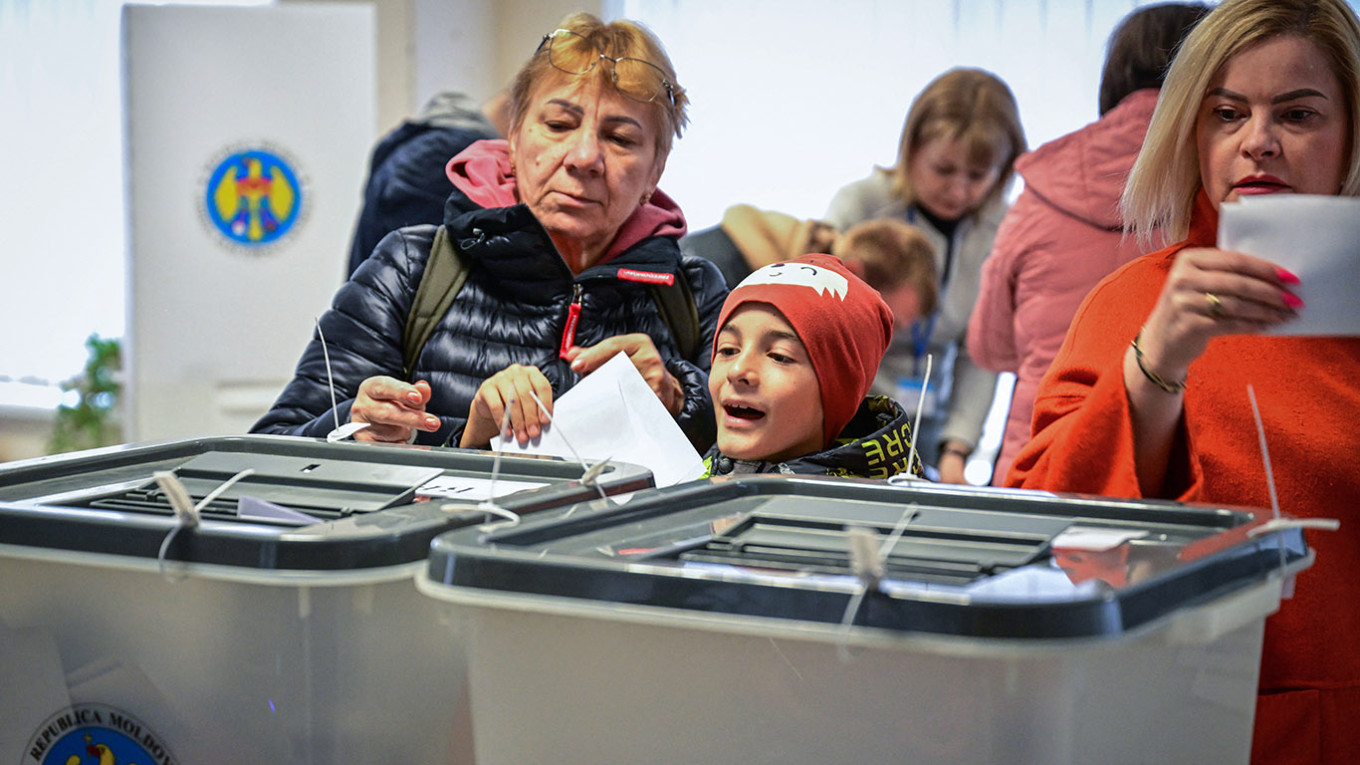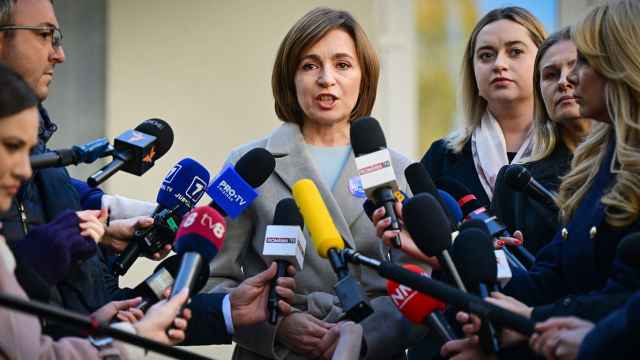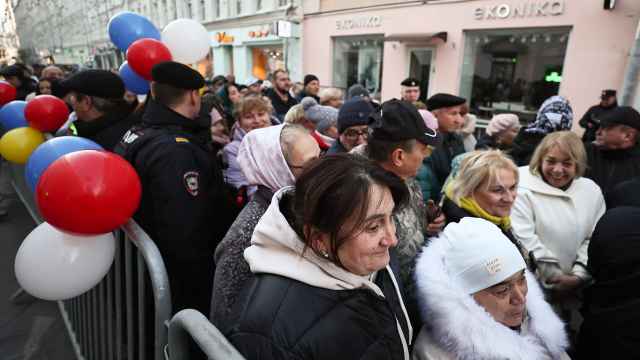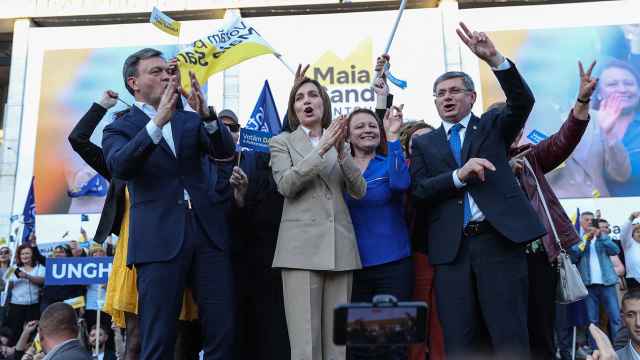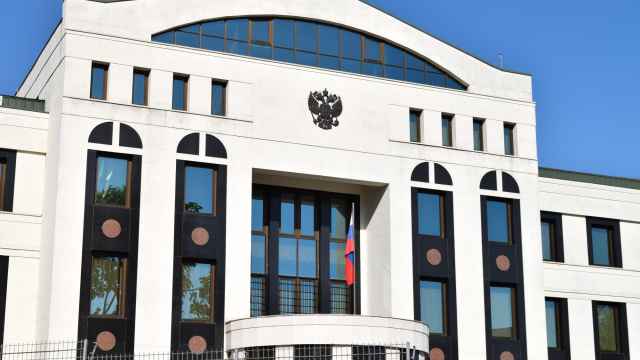CHISINAU, Moldova — Moldovans woke up to the news that the country’s referendum on joining the European Union was likely to pass by a razor-thin margin after a dramatic day of voting in Sunday’s presidential election that is set to determine whether the country pursues Western integration or pivots back toward Russia’s orbit.
Pre-election polls had predicted a more decisive win for pro-Western President Maia Sandu and for the referendum to enshrine EU ascension as a national goal in the country’s constitution.
But in a surprise development, Moldova, with a population of 3 million, passed the EU referendum by the skin of its teeth. “Yes” received 50.46% of the vote, a difference of just 13,596 votes, with 100% of votes counted.
Sandu topped the first round of voting with 42% but failed to secure the outright majority she needed to avoid a second round. She will face off against pro-Russian candidate Alexandr Stoianoglo, who received 26%. The second round of voting will take place on Nov. 2.
Moldova became an EU candidate in June 2022 following Russia’s full-scale invasion of Moldova’s neighbor Ukraine. Just last week, the EU guaranteed a 1.8 million-euro financial package to Chisinau as part of an Economic Growth Plan.
But widely reported attempts by Russia to sway Sunday’s vote, along with many Moldovans’ dissatisfaction over rising prices and falling living standards, appear to have brought the vote to a closer-than-expected margin.
“I feel ashamed as a Moldovan for these results,” says 33-year-old Daniel, who lives in Chisinau.
Daniel had hoped for a stronger victory in the EU referendum and for Sandu.
“People are living worse than they were before the war, and they associate this with Sandu, her party and EU integration,” he acknowledged.
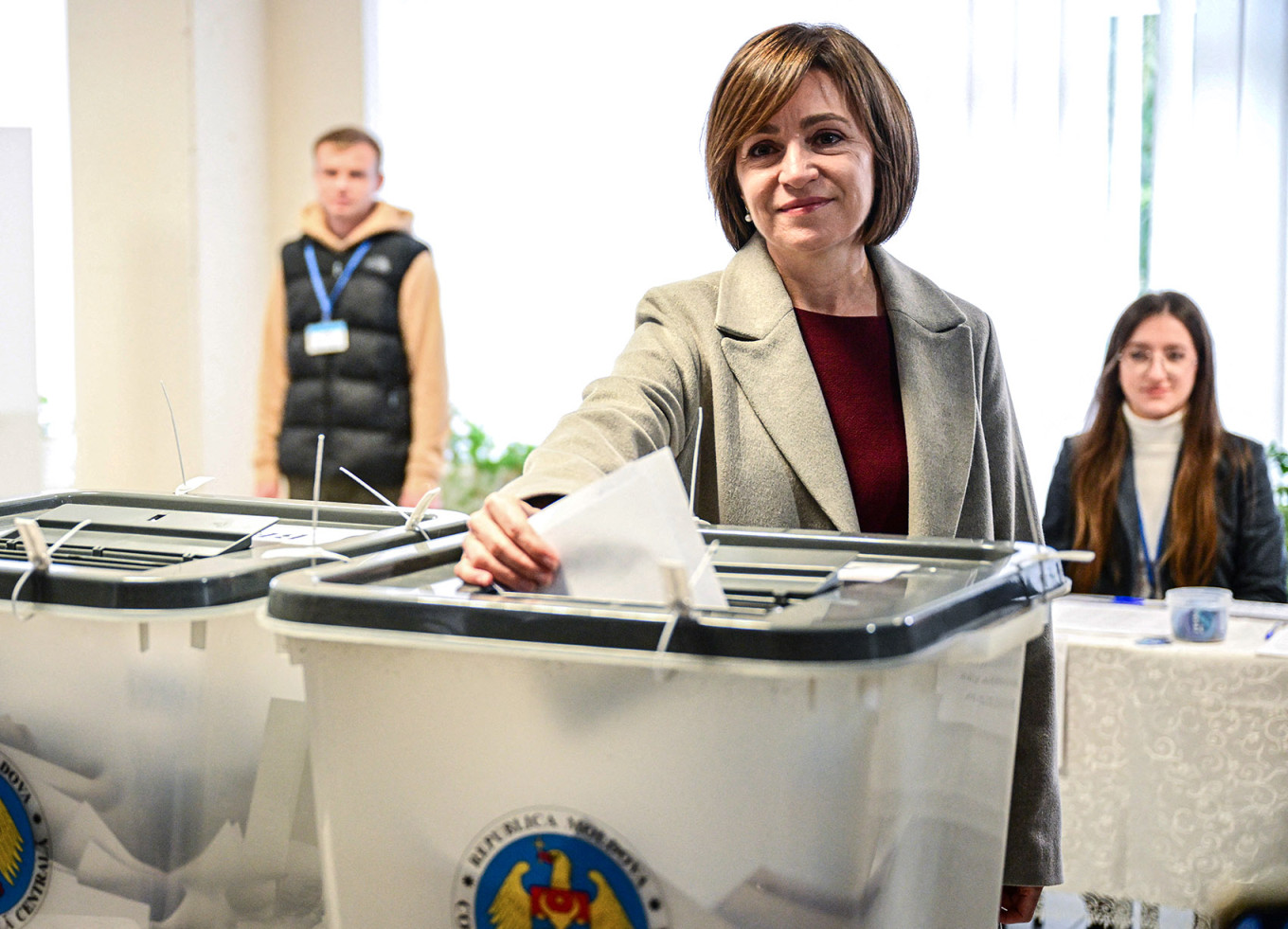
Moldova's inflation rate currently stands at 5%, a trend that has hit hard for citizens of one of Europe’s poorest countries.
“I believe this was a punishment vote, a vote against Sandu by voting against the EU," Daniel said.
The share of “yes” votes surged overnight as the diaspora votes were counted last, indicating that those residing in Moldova are generally less in favor of EU accession than those who are not. The Moldovan diaspora, especially those living in Europe, tends to be more pro-EU, as voting results show that over 70% of the diaspora voted for pro-EU incumbent Sandu and 77% supported EU integration.
“I don't even want to hear about Europe. There are only bandits there,” 74-year-old Valentina told The Moscow Times.
On Sunday morning, Valentina left her home early to cast her votes. Frustrated by rising prices, which she blames on Sandu's government, Valentina says her life has become difficult in recent years.
“I haven't paid utilities for three months because I’ve been saving money for firewood,” she said, referring to how the cost of firewood rose by 30% this year from last year. “When has firewood ever been the price it is now?”
An elderly gentleman nearby echoed her sentiment, saying, “It’s all exactly as she says.” Another woman walking by muttered “All lies” in disagreement.
Valentina cast her vote for Stoianoglo, Sandu’s main opponent who will face the incumbent president in the second round of voting. Stoianoglo represents the Party of Socialists, the same party as Sandu’s predecessor, Igor Dodon.
“He seems sensible, that lawyer,” Valentina said, referring to Stoianoglo.
For her, Moldova’s future depends on full independence, including staying out of the EU.
“We are Moldovans; we are for ourselves. Why should we comply when other countries demand us to?” she said.
In a delayed press conference that began at 1 a.m. local time on Monday morning, Sandu slammed what she described as an “unprecedented assault on our country's freedom and democracy, both today and in recent months.”
Sandu referenced reported efforts by Russian “criminal groups” to manipulate the electoral process, claiming they attempted to buy more than 300,000 votes to influence the election outcome against her re-election and EU integration.
In the week leading up to the election, reports surfaced indicating that Russia had organized bus transportation for diaspora voters to the Moldovan embassy, raising suspicions of further attempts to influence the election outcome in its favor.
Independent observers from Promolex reported instances of Russian interference at polling stations in Russia, where some voters allegedly received white jackets emblazoned with “Russia/Moldova,” were invited to restaurants and were given internet cards as voting benefits.
“We are seeing the classic hybrid toolbox Russia uses to influence elections, but the magnitude is really unprecedented,” Deputy Prime Minister and EU integration chief Cristina Gherasimov told Politico. “We see hybrid attacks on public institutions responsible for critical services like the post office and the airport. We see vote-buying. We see the use of local corrupt proxies and political parties — they’re given cash to destabilize the situation on the ground.”
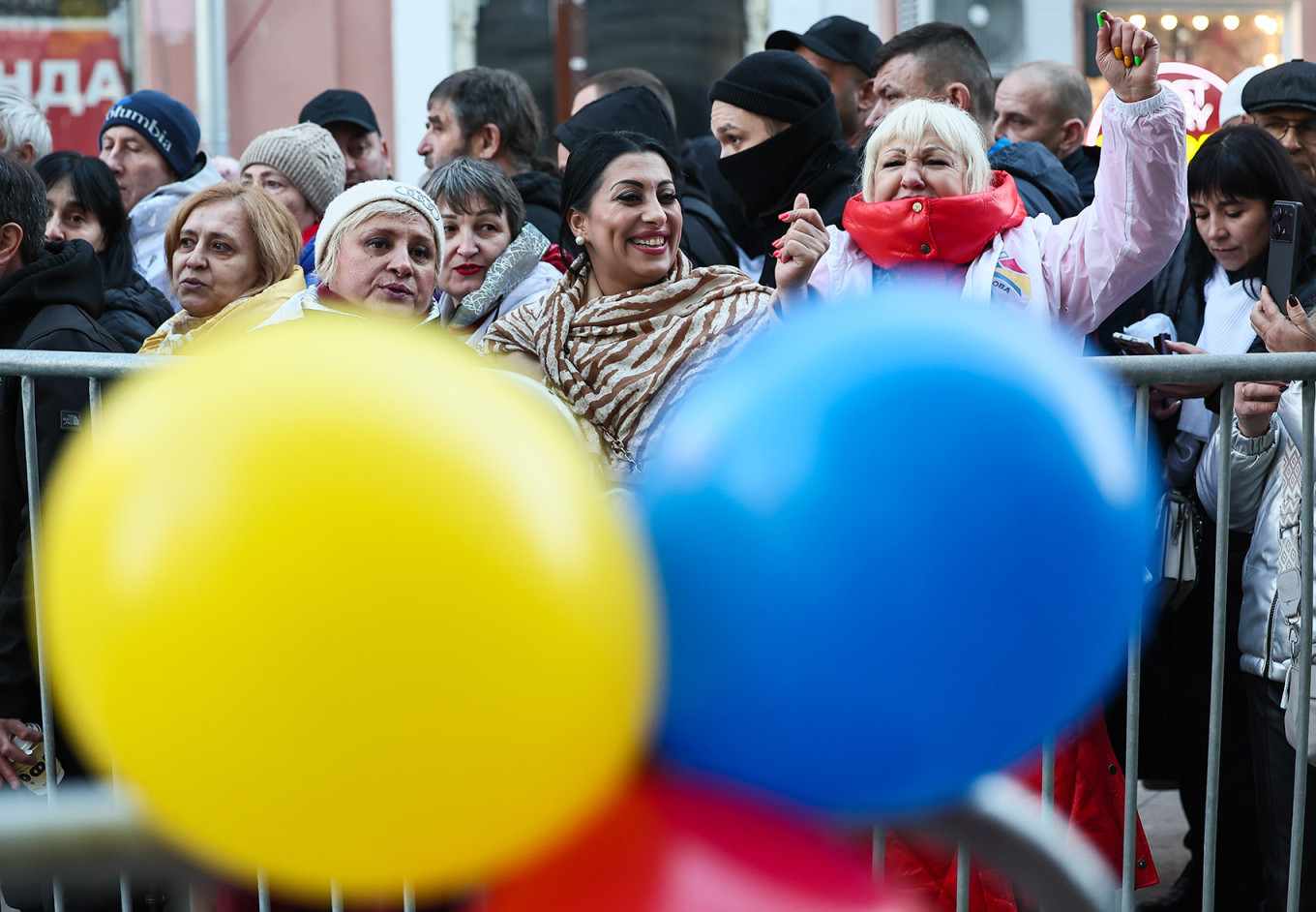
On Monday, an EU spokesperson decried “unprecedented interference” by Moscow and its proxies in the voting.
The Kremlin cast suspicion on the election’s results while also rejecting Sandu’s accusations of Russian interference.
“I am against any cooperation with Russia. The opposition candidates, as I see it, are more focused on restoring relations, and reestablishing ties with Russia. I don't support that,” said 26-year-old Galina, who voted at a polling station in downtown Chisinau on Sunday afternoon with her mother.
“The EU would offer us jobs, a better standard of living, and open borders for travel. In general, for me, it's all positives,” said Galina, who voted for Sandu.
“I think she is a strong leader; she has done a lot already in her time in office.”
Initial fears of low voter turnout — which could have jeopardized the legitimacy of the EU referendum — proved unfounded, as participation vastly exceeded the 33% threshold required for a valid result.
Grigory, 68, a lifelong resident of Chisinau who lived through the Soviet era until Moldova declared independence in 1991, expressed his support for the EU.
“In general, the European Union is a good idea,” he told The Moscow Times after casting his vote. “It would improve our economic ties, export, import. There would be more equality for everyone. That’s what I want; I want equality for everyone.”
Grigory also highlighted the potential benefits that EU membership would bring to the wider region.
“Even the situation with Transnistria will be better if we are part of the European Union, if Transnistria joins Moldova,” he said.
The voting patterns in Moldova revealed surprising trends, notably in the pro-Russian breakaway region of Transnistria, where approximately 38% of voters supported EU accession. This figure stands in stark contrast to the similarly pro-Moscow semi-autonomous region of Gagauzia, where only around 5% of voters expressed support for joining the EU.
“I am extremely proud to be Moldovan,” Grigory told The Moscow Times.
“We still have very strong family units and we grow our own food, many things are local, where else in the world can you say that? I want to see a beautiful, free Moldova,” he said.
As Moldova now anticipates a second round in the presidential election, the narrow win for the EU referendum has led some to hesitate in celebrating its outcome.
“This is a wake-up call to the actual situation, where we are and what our people are thinking,” Daniel told The Moscow Times, referring to the significant number of regions in Moldova that voted “no” in the EU referendum. “There is a lot of work to be done.”
A Message from The Moscow Times:
Dear readers,
We are facing unprecedented challenges. Russia's Prosecutor General's Office has designated The Moscow Times as an "undesirable" organization, criminalizing our work and putting our staff at risk of prosecution. This follows our earlier unjust labeling as a "foreign agent."
These actions are direct attempts to silence independent journalism in Russia. The authorities claim our work "discredits the decisions of the Russian leadership." We see things differently: we strive to provide accurate, unbiased reporting on Russia.
We, the journalists of The Moscow Times, refuse to be silenced. But to continue our work, we need your help.
Your support, no matter how small, makes a world of difference. If you can, please support us monthly starting from just $2. It's quick to set up, and every contribution makes a significant impact.
By supporting The Moscow Times, you're defending open, independent journalism in the face of repression. Thank you for standing with us.
Remind me later.


